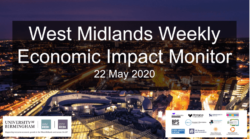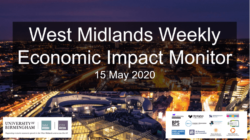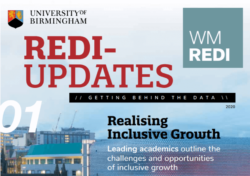WM REDI has been tasked with providing an up to date monitor of the current COVID-19 economic impacts, on a weekly basis. These reports will help regional partners to shape responses and interventions to boost the region’s resilience so that it can thrive going forward. Each week the focus of the report is based on … Continue reading “West Midlands Weekly Economic Impact Monitor – 22nd May 2020”
Category: Economics
Resilience and Inclusive Growth: Two Faces of the Same Dice?
Welcome to REDI-Updates. REDI-Updates is a bi-annual publication which will get behind the data and translate it into understandable terms. WM REDI staff and guest contributors will discuss various topics, with this first publication focusing on how inclusive growth can be a tool to tackle regional imbalances across the UK. In this article, Dr Anastasios … Continue reading “Resilience and Inclusive Growth: Two Faces of the Same Dice?”
REDI Updates 1: What is Inclusive Growth?
Welcome to REDI-Updates. REDI-Updates is a bi-annual publication which will get behind the data and translate it into understandable terms. WM REDI staff and guest contributors will discuss various topics, with this first publication focusing on how inclusive growth can be a tool to tackle regional imbalances across the UK. In this article, Professor Anne … Continue reading “REDI Updates 1: What is Inclusive Growth?”
The Impact of COVID-19 on Firm Innovation: The Case of the West Midlands
In this blog, Dr Chloe Billing explores the impact of COVID-19 on innovation activities in the West Midlands. A full range of business support measures has been made available to UK businesses to help with the current COVID-19 crisis. These were discussed in a recent blog by Professor Raquel Ortega Argiles and include the Coronavirus … Continue reading “The Impact of COVID-19 on Firm Innovation: The Case of the West Midlands”
Response to the Department for Business, Energy and Industrial Strategy (BEIS) Select Committee Inquiry on the Impact of COVID-19 on Businesses and Workers
City-REDI / WMREDI have collated information from a range of contributors as a response to the Department for Business Energy and Industrial Strategy (BEIS) Select Committee inquiry on the impact of COVID-19 on businesses and workers. It covers a variety of topics from identifying the complex and far-reaching impacts of the crisis to economic modelling … Continue reading “Response to the Department for Business, Energy and Industrial Strategy (BEIS) Select Committee Inquiry on the Impact of COVID-19 on Businesses and Workers”
West Midlands Weekly Economic Impact Monitor – 15th May 2020
WM REDI has been tasked with providing an up to date monitor of the current COVID-19 economic impacts, on a weekly basis. These reports will help regional partners to shape responses and interventions to boost the region’s resilience so that it can thrive going forward. Each week the focus of the report is based on … Continue reading “West Midlands Weekly Economic Impact Monitor – 15th May 2020”
City-REDI Webinar Series: The Batey-Madden model: forty years and counting (or should that be multiplying (?!) – 20th May, 1 pm – 2 pm
City-REDI will be holding a series of webinars over the next few months, details can be found below. Next up in the series is Peter Batey, Emeritus Professor of Town and Regional Planning, University of Liverpool: The Batey-Madden model: forty years and counting (or should that be multiplying (?!) Date: Wednesday, May 20th, 1:00-2:00 pm … Continue reading “City-REDI Webinar Series: The Batey-Madden model: forty years and counting (or should that be multiplying (?!) – 20th May, 1 pm – 2 pm”
REDI to Debate – The Effect of COVID-19 on Levelling-Up and the Government’s Green Book
Welcome to REDI to Debate in the first edition of REDI-Updates. REDI-Updates is a bi-annual publication which will get behind the data and translate it into understandable terms. WM REDI staff and guest contributors will discuss various topics, with this first publication focusing on how inclusive growth can be a tool to tackle regional imbalances … Continue reading “REDI to Debate – The Effect of COVID-19 on Levelling-Up and the Government’s Green Book”
REDI Updates 1: Director’s Welcome – Regional Research Collaboration Will Be Crucial to Improve Our Economy and Society
Foreword – by Simon Collinson and Ben Brittain When we began writing this, our first edition of REDI-Updates, the COVID-19 pandemic was a small and distant threat. A local crisis limited to a single city-region in China. The world has changed dramatically since then. As we re-focus our research efforts and our analytics towards projects … Continue reading “REDI Updates 1: Director’s Welcome – Regional Research Collaboration Will Be Crucial to Improve Our Economy and Society”
‘Getting on the Ladder’ – Challenges Facing Young People Leaving Education During COVID-19
Professor Anne Green looks at both the short and longer-term effects that COVID-19 will have on youth employment levels, as well as the influence different levels of education will have on this. Getting On The Career Ladder – Challenges for the Young When unemployment rates were relatively low and employment rates high a key concern … Continue reading “‘Getting on the Ladder’ – Challenges Facing Young People Leaving Education During COVID-19”










